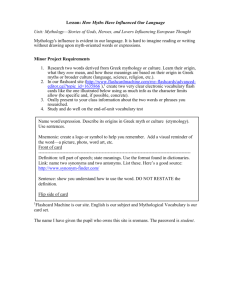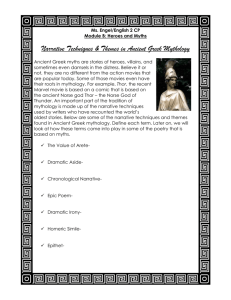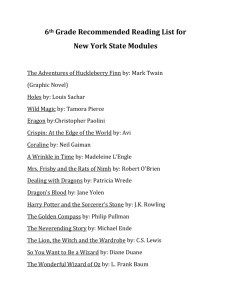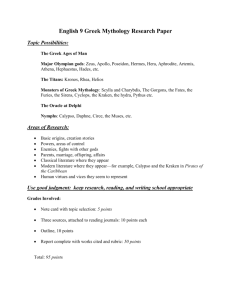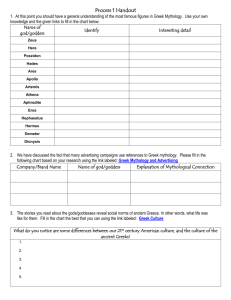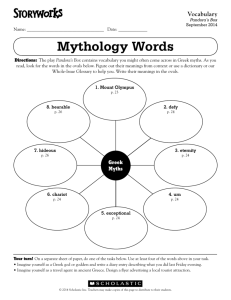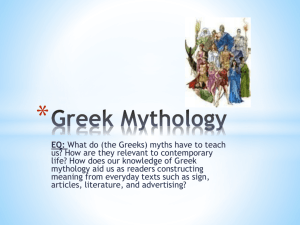Instructional Lesson Plan
advertisement
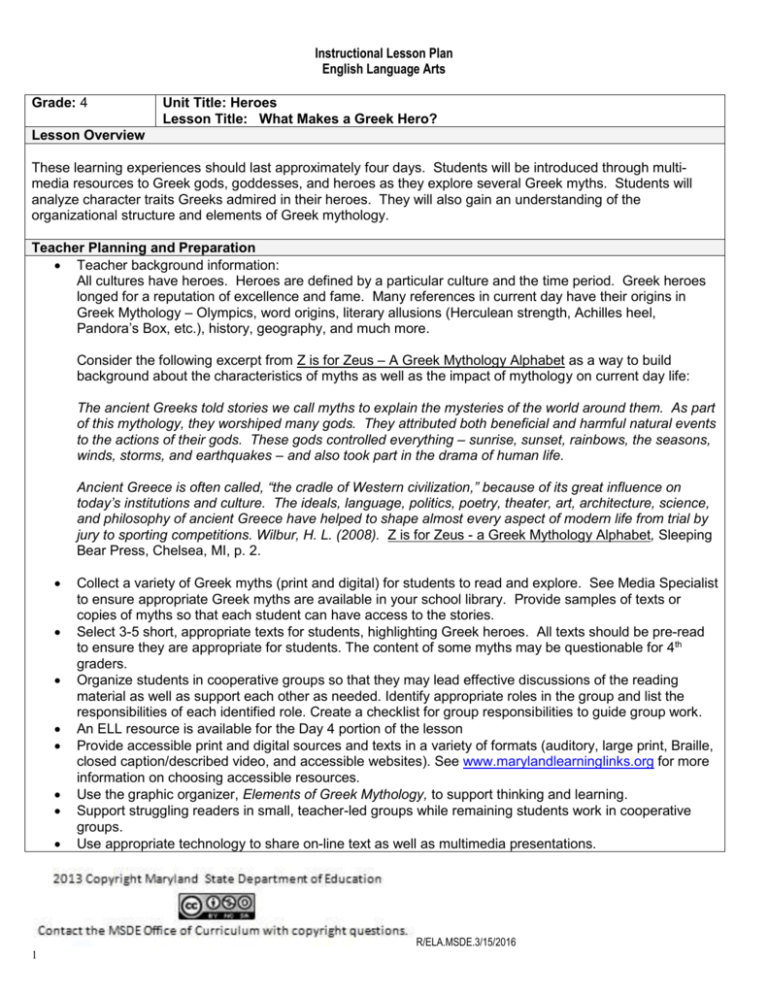
Instructional Lesson Plan English Language Arts Grade: 4 Unit Title: Heroes Lesson Title: What Makes a Greek Hero? Lesson Overview These learning experiences should last approximately four days. Students will be introduced through multimedia resources to Greek gods, goddesses, and heroes as they explore several Greek myths. Students will analyze character traits Greeks admired in their heroes. They will also gain an understanding of the organizational structure and elements of Greek mythology. Teacher Planning and Preparation Teacher background information: All cultures have heroes. Heroes are defined by a particular culture and the time period. Greek heroes longed for a reputation of excellence and fame. Many references in current day have their origins in Greek Mythology – Olympics, word origins, literary allusions (Herculean strength, Achilles heel, Pandora’s Box, etc.), history, geography, and much more. Consider the following excerpt from Z is for Zeus – A Greek Mythology Alphabet as a way to build background about the characteristics of myths as well as the impact of mythology on current day life: The ancient Greeks told stories we call myths to explain the mysteries of the world around them. As part of this mythology, they worshiped many gods. They attributed both beneficial and harmful natural events to the actions of their gods. These gods controlled everything – sunrise, sunset, rainbows, the seasons, winds, storms, and earthquakes – and also took part in the drama of human life. Ancient Greece is often called, “the cradle of Western civilization,” because of its great influence on today’s institutions and culture. The ideals, language, politics, poetry, theater, art, architecture, science, and philosophy of ancient Greece have helped to shape almost every aspect of modern life from trial by jury to sporting competitions. Wilbur, H. L. (2008). Z is for Zeus - a Greek Mythology Alphabet, Sleeping Bear Press, Chelsea, MI, p. 2. Collect a variety of Greek myths (print and digital) for students to read and explore. See Media Specialist to ensure appropriate Greek myths are available in your school library. Provide samples of texts or copies of myths so that each student can have access to the stories. Select 3-5 short, appropriate texts for students, highlighting Greek heroes. All texts should be pre-read to ensure they are appropriate for students. The content of some myths may be questionable for 4th graders. Organize students in cooperative groups so that they may lead effective discussions of the reading material as well as support each other as needed. Identify appropriate roles in the group and list the responsibilities of each identified role. Create a checklist for group responsibilities to guide group work. An ELL resource is available for the Day 4 portion of the lesson Provide accessible print and digital sources and texts in a variety of formats (auditory, large print, Braille, closed caption/described video, and accessible websites). See www.marylandlearninglinks.org for more information on choosing accessible resources. Use the graphic organizer, Elements of Greek Mythology, to support thinking and learning. Support struggling readers in small, teacher-led groups while remaining students work in cooperative groups. Use appropriate technology to share on-line text as well as multimedia presentations. R/ELA.MSDE.3/15/2016 1 Instructional Lesson Plan English Language Arts Provide many concrete and varied examples. Provide vocabulary lists of terms to aid in comprehension. Provide student access to computers. Provide assistive technology (text to speech/speech to text software, recording devices for drafts, word prediction, concept mapping, etc.) for composing written responses if needed. Other supports could include: sentence starters, modeling out-loud the writing prompt and/or guided steps through the writing process. Essential Question What are the many facets of heroism? How do the facets of modern heroism compare to Greek myths? Unit Standards Applicable to This Lesson RL.4.1 Refer to details and examples in a text when explaining what the text says explicitly and when drawing inferences from the text. RL.4.2 Determine a theme of a story, drama, or poem from details in the text; summarize the text. RL.4.3 Describe in depth a character, setting, or event in a story or drama, drawing on specific details in the text (e.g., a character’s thoughts, words, or actions). RL.4.4 Determine the meaning of words and phrases as they are used in a text, including those that allude to significant characters found in mythology (e.g., Herculean). RL.4.9 Compare and contrast the treatment of similar themes and topics (e.g., opposition of good and evil) and patterns of events (e.g., the quest) in stories, myths, and traditional literature from different cultures. W.4.1 Write opinion pieces on topics or texts, supporting a point of view with reasons and information. W.4.2 Write informative/explanatory texts to examine a topic and convey ideas and information clearly. W.4.9a Draw evidence from literary or informational texts to support analysis, reflection, and research. Apply grade 4 Reading Standards to literature (e.g., “Describe in depth a character, setting or event in a story or drama, drawing on specific details in the text [e.g., a character’s thoughts, words, or actions].”). S.4.1 Engage effectively in a range of collaborative discussions (one-on-one, in groups, and teacher-led) with diverse partners on grade 4 topics and texts, building on others’ ideas and expressing their own clearly. L.4.6 Acquire and use accurately grade-appropriate general academic and domain-specific words and phrases, including those that signal precise actions, emotions, states of being (e.g., quizzed, whined, stammered) and that are basic to a particular topic (e.g., wildlife, conservation, and endangered when discussing animal preservation). Student Outcomes Students will read Greek myths to understand the content and structure of Greek mythology. Students will compare the story elements present in all Greek myths. Students will make inferences and draw conclusions about the characteristics Greeks admired in heroes. Students will determine the meaning of words and phrases based on Greek literature. Materials Student copies of Elements of Greek Mythology graphic organizer; Suggested texts for partner and/or individual reading: http://www.activityvillage.co.uk/greek_myths_for_kids.htm (printable Greek myths for kids) www.mythweb.com/heroes/heroes.html (on-line readings of Greek myths) R/ELA.MSDE.3/15/2016 2 Instructional Lesson Plan English Language Arts on-line text about Hercules such as http://teacher.scholastic.com/writewit/mff/greece.htm on-line text about Perseus such as http://www.mythweb.com/heroes/perseus/index.html on-line text about Jason such as http://www.mythweb.com/heroes/jason/index.html Consider the need for captioned/described video. See “Sources for Accessible Media” at www.marylandlearninglinks.org. Pre-Assessment Use a graphic organizer, such as a KWL chart, to brainstorm and share background knowledge about Greek Mythology. These ideas may be based on students’ experiences, stories they have read such as the Percy Jackson series, Magic Tree House series and other Mary Pope Osborne novels such as Tales From the Odyssey, or from movies such as Disney’s Hercules. Lesson Procedure Day 1: View an introduction to ancient Greece video at http://www.carlos.emory.edu/ODYSSEY/GREECE/welcome.html. Once the video is complete, click on the tab “Gods, Goddesses, & Heroes” on the bottom of the screen. This will bring about one slide with music that can be used to introduce the next topic: the characters of Greek Myths – Gods, Goddesses & Heroes. Read the text explaining the background of myths. Add to/revise the graphic organizer that was used as a pre-assessment. Work in differentiated cooperative groups to read a minimum of two Greek myths. Use either the teacher provided graphic organizer, Elements of Greek Mythology, or one of your own to compare commonalities among the myths. It may benefit the students if the teacher completes the first row of the organizer as a model for student group work. Teacher should lead students to notice myths may contain the following similarities: gods and goddesses are central characters with special powers; a natural phenomenon, occurrence, or event is explained; a lesson is taught or a cultural or moral value is explained; gods and goddesses interact with mortals; gods and goddesses display positive and negative human behaviors; gods and goddesses often play tricks on mortals and one another. Teacher and/or students share a brief synopsis of the myths and the common elements noticed in the myths. Days 2-3: Examine the character traits of heroes in Greek Mythology by choosing one of the online texts listed below or another of your choice, or reread their myth from yesterday. Homepage for Greek Heroes http://www.mythweb.com/heroes/heroes.html on-line text about Hercules such as http://teacher.scholastic.com/writewit/mff/greece.htm on-line text about Perseus such as http://www.mythweb.com/heroes/perseus/index.html on-line text about Jason such as http://www.mythweb.com/heroes/jason/index.html Have students determine traits valued in Greek heroes such as – glory, loyalty, hospitality, valor, strength, courage, reputation, clever, dutiful, or bold. Review the Hero Trait Organizer completed in lesson seed #3. Discuss, with charting, how the Hero Trait Organizer compares with the Traits of Greek Heroes. (Greeks admired fame, etc.). Use concrete examples and/or vocabulary lists to scaffold for learners, if needed. Help students understand that all cultures have values. Heroes reflect the values of the culture. This is revealed through the heroes depicted in the literature/stories of a particular time period. R/ELA.MSDE.3/15/2016 3 Instructional Lesson Plan English Language Arts Have students review and discuss their definition of a hero (created throughout the unit). Does Hercules fit the definition? Achilles? Why or why not? Have students respond in writing to the following prompt (see teacher preparation section for additional ways to scaffold for understanding): How do the facets of modern heroism compare to Greek myths? Cite examples from your sources to support your thinking. Day 4: The purpose of today’s lesson is to support students in understanding the meaning of words and phrases that allude to significant characters found in mythology. Many terms used today have their origins in Greek mythology (nemesis, narcissistic). Click here for ELL resources. Read a myth about King Midas and his golden touch. Help students understand the allusion to Midas’ touch is based on this myth. Everything he touched turned to gold. Although it seems that having lots of gold would be wonderful, Midas turned his daughter as well as his food into gold. The lesson to learn: be careful what you wish for. Help students understand many phrases we use today are based on the Greek myths. Have students listen as you read and post interesting phrases: o Herculean effort: It will take a Herculean effort to win the basketball game against the world champs o Achilles’ heel: Math is his Achilles’ heel, preventing him from getting straight A’s o Midas touch: I always choose her as my partner because of her Midas touch. She always wins. o Pandora’s box: Asking the students to make up all the school rules was like opening Pandora’s box. Have students work in a small group to read assigned Greek myths linked to the phrases. Ask them to use details from the reading to infer the meaning of the phrase that has been assigned to their group. (Assign group roles & review responsibilities) Have students present the meaning of their group’s phrase to the class, citing evidence to support reasoning. Lesson Closure Reflect back on the ideas in your brainstorming Greek Mythology graphic organizer. Think about what you have learned about how Greek heroes compare to modern day heroes and about words we use today that began with Greek heroes. R/ELA.MSDE.3/15/2016 4
